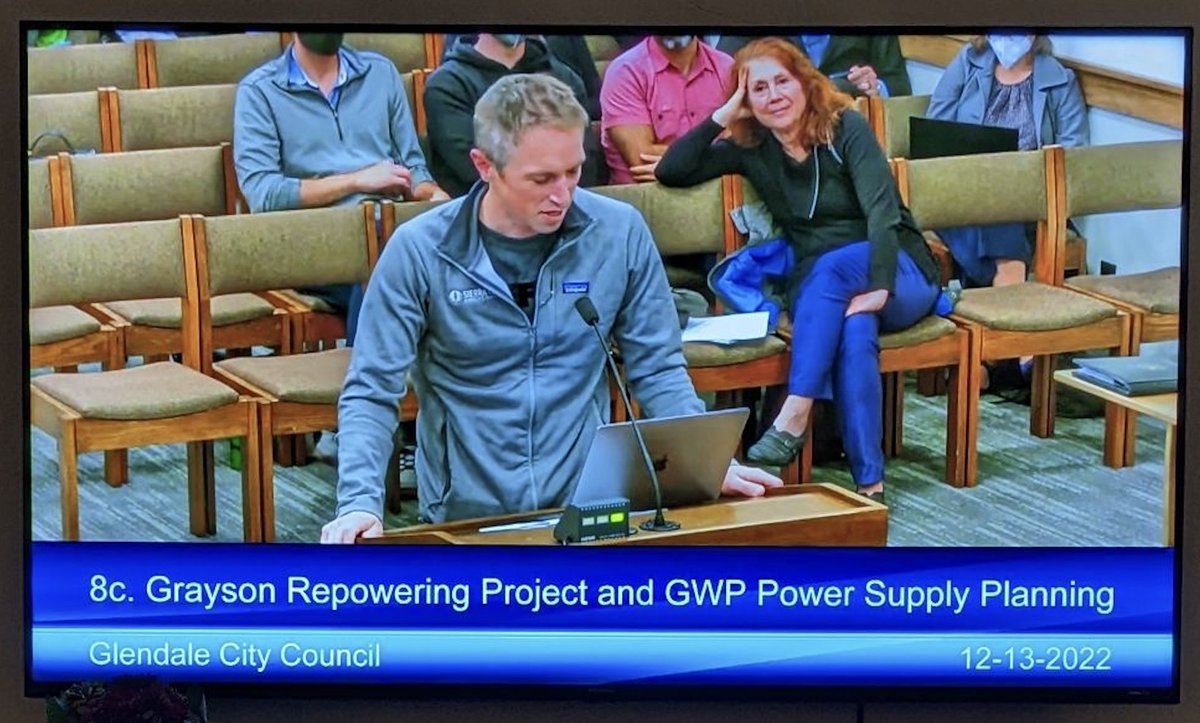Glendale Voted to Build the Last Gas Plant in CA
Updated January 18, 2023 at 1:58pm
On December 13, the Glendale City Council voted 4-1 to approve the $170 million purchase of new gas units at the Grayson Power Plant. Their decision moves Glendale in the opposite direction of the rest of the state and locks the region into fossil fuel use for decades to come.
For years, Glendale residents led by the Glendale Environmental Coalition (GEC) have successfully challenged the purchase of new gas units at the Grayson Power Plant, and ironically, the disappointing vote came on the heels of a historic year for climate action: the Inflation Reduction Act is the single largest climate investment in our nation’s history; the state budget provides a game-changing six billion dollars for energy resiliency, reliability and fossil fuel phase-out programs; and because of our joint advocacy with the California Environmental Justice Alliance, the Governor and California Air Resources Board declared there would be “no new gas plants” in the state’s climate roadmap.
Perhaps most remarkable was that one week before the City Council’s vote, the City’s own consultant, EcoMotion, released a report showing that Glendale could get more energy (up to 126 megawatts) from proven clean energy programs on the same timeline than would be provided by the new gas-burning engines (56 megawatts).
Before the vote, a dozen local Glendale civic organizations called on the Council to reject the purchase of new gas engines at Grayson, and the Sierra Club placed full-page ads in the Glendale News Press and Pasadena Star.
Nevertheless, the City’s utility, Glendale Water & Power, inflated its peak demand projections once again days before the vote in a report to the Council and made the case that even its recommendation for five gas-burning engines was insufficient to meet Glendale’s projected energy needs.
The night of the decision, more than thirty Glendale residents gave powerful testimony late into the evening, urging the City Council to prioritize distributed clean energy solutions instead of polluting fossil fuel energy. Glendale resident and mom Vicki Kaplan summed it up well: “I see a big arrow of the state of California moving forward, the United States moving forward, and our beautiful little city of Glendale moving in the other direction.”
Ultimately, the Council approved three engines, insisting that they were needed as an insurance policy, “just in case.” Councilmember Elen Asatryan, the lone dissenting vote, courageously stood for no gas. Council Asatryan declared, "It's fiscally irresponsible for us to invest in this when we have to get out of [fossil fuel generation] by 2035... I believe our residents deserve better and I think we can make a better commitment toward what we build and what we put our money toward."

Chapter Director Morgan Goodwin speaks at December’s GCC meeting. The Glendale City Council is considering whether to waste money on new gas engines at the Grayson Power plant. We're here with Glendale Environmental Coalition to say "no new gas". Glendale doesn't need it, and the climate really doesn't need it.
“Glendale is the front line on a much larger fight - the climate fight,” said Morgan Goodwin, Sierra Club Angeles Chapter Director. “We cannot invest in new gas infrastructure. Luckily Glendale can get enough power from renewable programs to meet its actual needs. This is why we’re so disappointed in this decision.”
The original Grayson Repowering Project first proposed in 2017 would have saddled ratepayers with a $500 million investment in 262 megawatts of new gas-fired engines. Because of years of unrelenting advocacy by the GEC and Sierra Club, the Council’s most recent approval is an 80% reduction from the original proposal. Nonetheless, Sierra Club, represented by Earthjustice, will continue to pursue its lawsuit against the City to revise the City’s environmental review of the project and accurately account for energy demand in Glendale as well as the extent of pollution from the new gas-burning engines
In addition to fighting the bad, it’s critical to support solutions for the alternatives we want, which is why we must support better incentives for clean energy programs. These include rooftop solar and batteries, energy efficiency, and peak load reduction measures, like paying residents to conserve energy (“demand response”) and using their EVs to send power back to the grid (“vehicle to grid integration”) during times of extreme grid stress
As we make headway in our transportation and building electrification goals, we expect that utilities will continue to argue that we need to burn more polluting fuels to power the grid. And we will continue to reject this false choice. A true decarbonization strategy cannot be based on building out and sustaining a polluting power sector
We shouted this from the rooftops when we joined more than 300 environmental justice activists and volunteers in Sacramento earlier this year, and we won. CARB eliminated all new planned gas (about 100 new peaker plants worth!) from the Scoping Plan, our state’s climate blueprint.
For now, we should celebrate that all signs point to a future with no new gas in California, and we will continue to fight to bring Glendale along in that future.
Header image: Grayson Power Plant - Glendale, CA



Comments
Steve Morgan (not verified)
January 9, 2023 - 9:09pm
Permalink
gasoline powered plant
Robert Rudolph (not verified)
January 10, 2023 - 1:27am
Permalink
Clean Power for a better future
Kathrine E. (not verified)
January 10, 2023 - 11:14am
Permalink
Recheck your facts
Add new comment